Those scratching, scurrying sounds in your ceiling aren’t just annoying—they’re a sign that squirrels have chosen your attic as their new home. Squirrels in attics can cause significant damage to insulation, wiring, and structural elements while creating health hazards through their droppings and urine. This comprehensive guide shows you how to identify, remove, and prevent squirrels from turning your attic into their personal living space using humane, effective methods backed by wildlife experts.
Quick Picks: How to Get Rid of Squirrels in the Attic
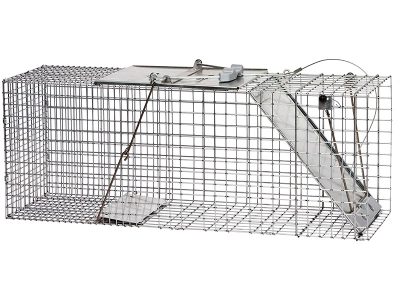
Humane Option
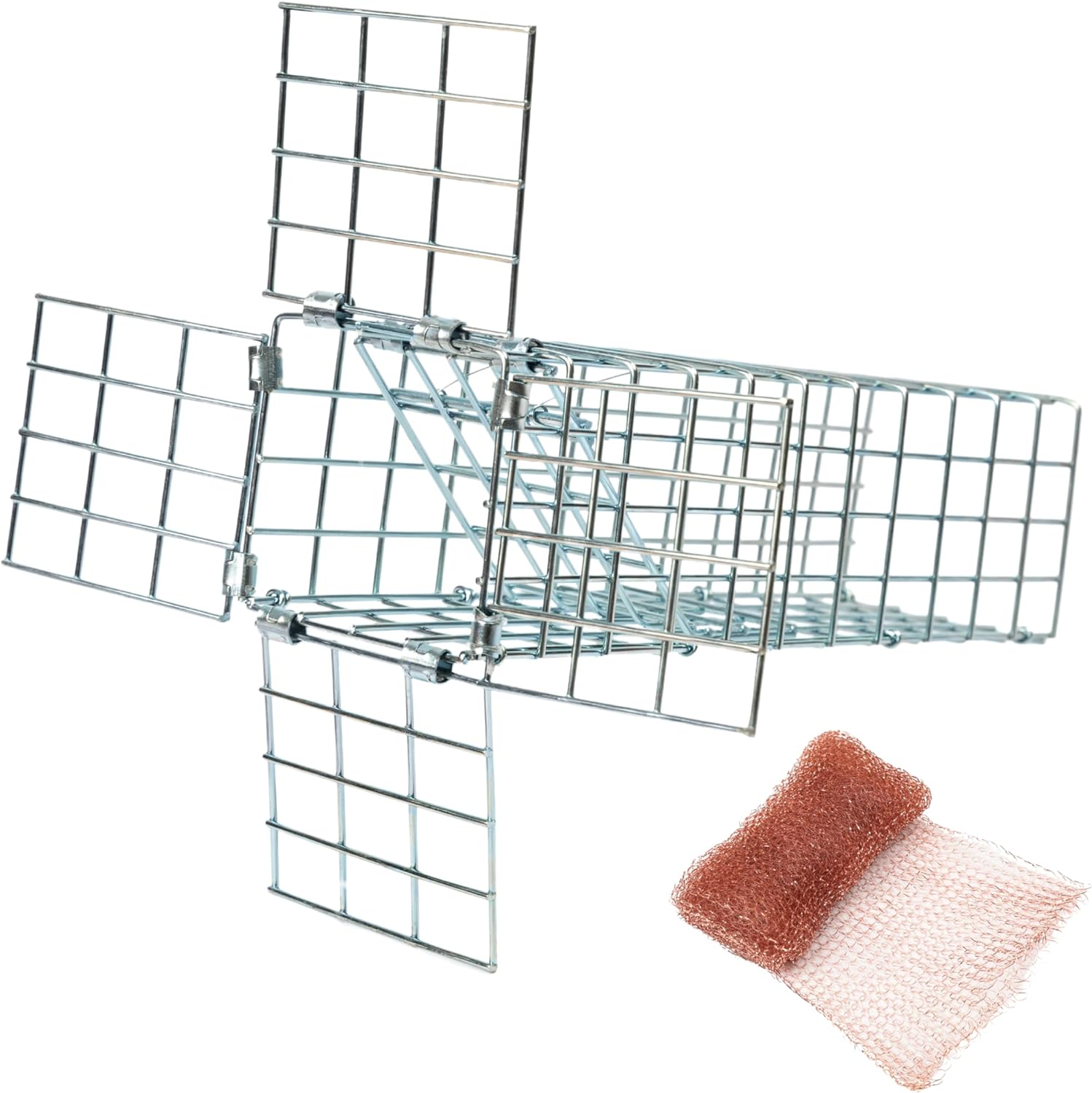
Set and Forget
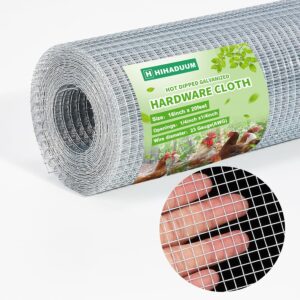
Best for Sealing
Why Do Squirrels Choose Your Attic?
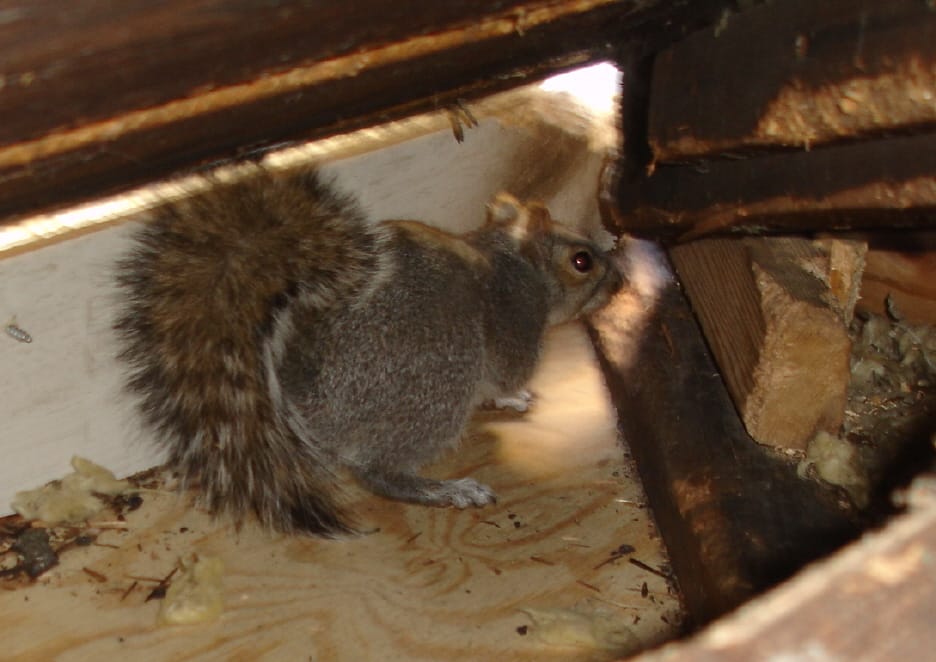
Understanding why squirrels invade attics is the first step toward effective removal and prevention. Your attic provides several key benefits that make it an ideal habitat for squirrels:
Warmth & Shelter
Attics provide consistent warmth and protection from harsh weather conditions, predators, and other threats—ideal conditions for raising young squirrels.
Perfect Nursery
Female squirrels seek secure, quiet places to give birth and raise their young—your insulation makes perfect nesting material for their babies.
Safety
The elevated, protected nature of attics mimics the natural tree cavity habitats that squirrels prefer in the wild, but with even better protection.
According to wildlife experts, squirrels typically have two breeding seasons per year: late winter/early spring (January-April) and late summer/early fall (July-September). These periods correspond with the most common times for attic invasions.
Signs You Have Squirrels in Your Attic
Before implementing any removal strategy, confirm that squirrels are indeed the source of your attic problems by looking for these telltale signs:
If you hear noises in your attic during breeding seasons (February-April or August-September), there’s a high probability you’re dealing with a mother squirrel and her babies. This significantly impacts the removal approach you should take.
5 Steps to Remove Squirrels from Your Attic
STEP 1: Determine If You Have Baby Squirrels
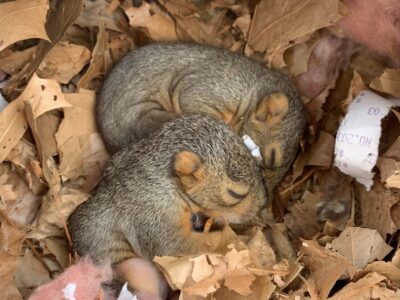
Before taking any removal action, determine whether you’re dealing with a mother squirrel and her babies. This crucial first step affects your entire approach to the situation.
According to wildlife removal experts, attempting to remove a mother squirrel without addressing her babies can lead to severe problems, including orphaned babies dying in your attic, mothers desperately damaging your home trying to return, and serious odor issues.
Signs of baby squirrels in your attic include:
- High-pitched chirping or “bird-like” sounds
- More frequent coming and going of an adult squirrel (foraging for her young)
- Increased activity during breeding seasons (February-April or August-September)
- Visible nest construction using insulation, paper, or fabric
Expert Tip: Handling Baby Squirrels
If you discover a nest with baby squirrels, the most humane approach is to wait until they’re mobile (about 6-8 weeks old) before attempting removal, or to work with a wildlife professional who can safely reunite the babies with their mother outside your home.
STEP 2: Identify All Entry Points
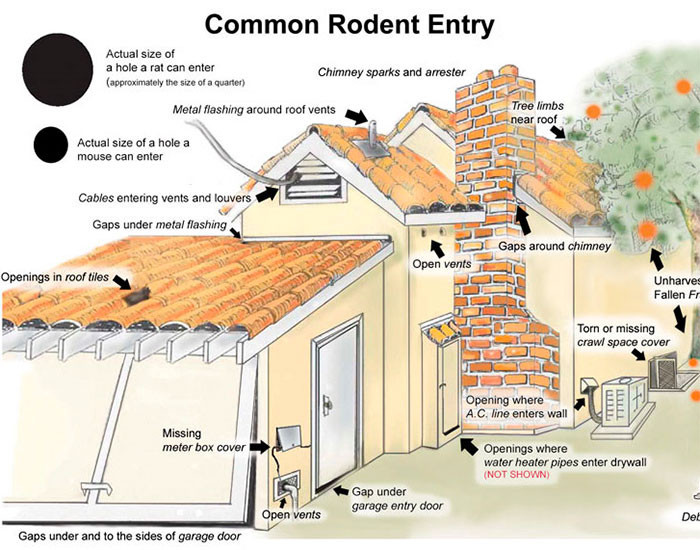
Thoroughly inspect your home’s exterior to locate all potential entry and exit points that squirrels are using to access your attic.
Common entry points include:
- Damaged roof vents or louvers
- Gaps in soffits or fascia boards
- Spaces around chimneys
- Holes under eaves
- Uncapped chimneys
- Deteriorated areas on rooflines
Mark entry points with colored tape or flags to make them easier to locate later during the sealing process. Remember that squirrels can squeeze through openings as small as 1.5 inches in diameter.
STEP 3: Install a One-Way Door or Live Trap
After identifying entry points, it’s time to implement a humane removal method that allows squirrels to exit but prevents re-entry.
Excluder Pro One Way Squirrel and Rodent Trap
Set and ForgetHow Does It Work
How to Use
- Identify the main entry/exit point used by squirrels in your walls
- Install the device by securing it over the opening using nails or staples
- Use the included copper mesh wool to seal any gaps around the edges
- Adjust the four flaps to ensure a secure fit against irregular surfaces
- Leave the device in place for 3-7 days to ensure all animals have exited
- Once activity ceases, remove the device and permanently seal the opening
- Humanely removes animals without trapping or handling
- Premium heavy-duty metal construction cannot be chewed through
- Includes copper mesh wool (superior to steel wool) for complete sealing
- Easy installation with adjustable flaps for various surfaces
- Effective for multiple species of wall-invading pests
- 3x3 inch opening may not accommodate larger squirrels
- Requires proper installation to be effective
- All secondary entry points must be identified and sealed
- May require additional hardware for certain mounting surfaces
According to The Spruce, “Only use [exclusion] methods from November to February when squirrels are not breeding. During breeding times, you might permanently separate a mother squirrel from her litter.”
The two most effective removal options are:
Option A: One-Way Door Installation
One-way doors or exclusion devices allow squirrels to leave but prevent their return.
- Seal all entry points except the main one the squirrels are actively using
- Install a one-way door over this primary entry point
- Ensure the device is securely attached to prevent squirrels from working around it
- Monitor for several days to confirm all squirrels have exited
Option B: Live Trapping
Live trapping can be effective, especially if exclusion isn’t feasible or if you need to remove squirrels quickly.
- Place live traps near active entry/exit points or along squirrel paths
- Bait with effective attractants like peanut butter, nuts, or fruit
- Check traps at least twice daily for humane reasons
- Continue trapping until all activity ceases
- Relocate captured squirrels according to local wildlife regulations
Havahart Live Animal Trap
Most EffectiveHow Does It Work
How to Use
- Place the trap along known squirrel pathways or near identified entry/exit points
- Bait with peanut butter, nuts, or apple slices placed at the far end of the trap
- Check the trap at least twice daily to minimize stress to captured animals
- Wear thick gloves when handling the trap with a captured squirrel
- Transport and release at least 5 miles away in suitable habitat (where legally permitted)
- Humane capture without harming animals
- Sturdy construction for multiple uses
- Effective sensitive trigger mechanism
- Easy to bait and set
- Carrying handle for safe transport
- Requires regular checking to prevent animal distress
- May capture non-target animals
- Some states restrict wildlife relocation
- Not effective for baby squirrels
Research indicates that relocated squirrels often have poor survival rates. Experts from Native Animal Rescue point out that “relocation is a feel-good myth” and that many states discourage or even ban wildlife relocation. Check local regulations before attempting relocation.
STEP 4: Use Deterrents to Encourage Departure
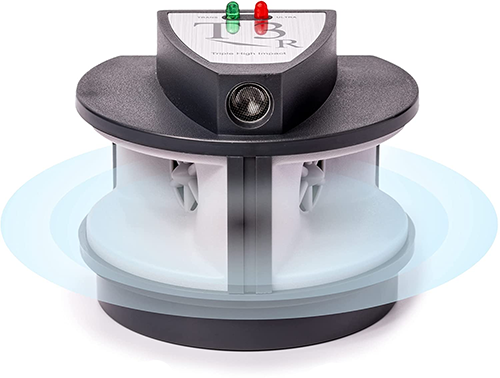
While one-way doors or traps are in place, you can accelerate the squirrels’ departure by making your attic less hospitable.
Noise Deterrents
Play a radio tuned to a talk station at moderate volume in your attic, or create periodic noise by banging on the ceiling to disturb the squirrels.
Light Deterrents
Install bright lights in your attic and leave them on continuously for several days, as squirrels prefer dark, quiet nesting areas.
Scent Deterrents
Place rags soaked in apple cider vinegar, ammonia, or predator urine near squirrel nesting areas to create an unwelcoming environment.
Mix 1 tablespoon of cayenne pepper or crushed garlic with 2 cups of hot water and a few drops of dish soap. After cooling, transfer to a spray bottle and apply around entry points and nesting areas.
STEP 5: Seal Entry Points and Clean Up
Once you’re confident all squirrels have left your attic, immediately seal all entry points to prevent reinfestation and clean the affected areas.
1/4-inch Hardware Cloth
Best for SealingHow Does It Work
How to Use
- Cut the hardware cloth to size using tin snips, leaving at least 3 inches of overlap around the opening
- Shape to fit the contour of the area being sealed
- Secure with screws and washers every 2-3 inches along the perimeter
- Bend edges for a tight fit against irregular surfaces
- For circular openings like pipes, cut a star pattern and fold edges around the pipe
- Effectively blocks all squirrels while allowing airflow
- Galvanized for weather resistance and longevity
- Can be cut and shaped to fit any opening
- Strong enough to resist gnawing and clawing
- More durable than plastic mesh alternatives
- Sharp edges require careful handling during installation
- Heavier than plastic alternatives
- Can be visible on home exterior if not painted
- May require special tools to cut properly
Effective Sealing Materials:
- 1/4-inch galvanized hardware cloth (most effective)
- Metal flashing
- Steel wool combined with expandable foam (for smaller gaps)
- Professional-grade sealants
According to Pests in the Home from the University Extension service, “The most dangerous aspect of squirrels inside your home is the likelihood that they will chew electrical wiring. These damaged wires create a substantial risk of fire.”
Clean-Up Guidelines:
- Wear protective gear, including gloves, goggles, and a respirator mask
- Remove nesting materials and contaminated insulation
- Disinfect affected areas with an appropriate cleaner
- Consider replacing damaged insulation
- Check electrical wiring for damage and consult an electrician if needed
Special Considerations for Baby Squirrels
Removing squirrels becomes more complex when babies are involved. Understanding their development stages and proper handling is essential for humane removal.
| Age of Baby Squirrels | Appearance/Development | Recommended Action |
|---|---|---|
| 0-2 weeks | Hairless, pink, eyes closed, entirely dependent | Do not attempt removal without professional help; babies will die without mother |
| 3-5 weeks | Fur developing, eyes opening, limited mobility | Use heated baby box near main entry with one-way door to allow mother to relocate babies |
| 6-8 weeks | Fully furred, active, beginning to explore | One-way doors may work as juveniles can follow mother out |
| 8-10 weeks | Nearly adult size, fully mobile and active | Standard removal techniques effective; juveniles can exit on their own |
Wildlife removal experts advise that baby squirrels remain dependent on their mother for approximately 10-12 weeks. Attempting removal during this period requires special considerations to ensure humane treatment of both mother and babies.
Humane Baby Squirrel Removal Options
If you discover you have baby squirrels in your attic, consider these humane approaches:
Prevention: Keep Squirrels Out for Good
After successfully removing squirrels from your attic, take these preventive measures to ensure they don’t return.
1. Perform Regular Home Inspections
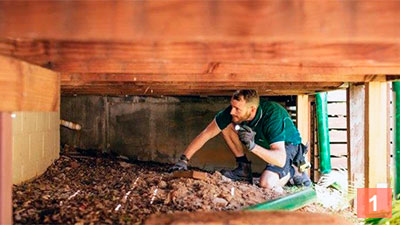
Conduct thorough inspections of your home’s exterior at least twice a year, focusing on:
- Roof edges, soffits, and fascia boards
- Vents, chimneys, and utility entrances
- Areas showing signs of rot or damage
- Previous entry points that may need reinforcement
2. Eliminate Access Routes
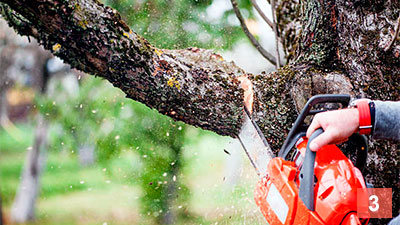
Squirrels typically reach your roof by jumping from nearby trees or climbing up the side of your house.
Trim tree branches at least 10 feet away from your roofline to prevent squirrels from jumping onto your home. This simple step can significantly reduce the likelihood of squirrels accessing your attic.
- Trim overhanging branches that provide “bridges” to your roof
- Remove vines or ivy growing on exterior walls
- Consider installing barriers on downspouts or pipes that squirrels might climb
3. Secure Potential Entry Points
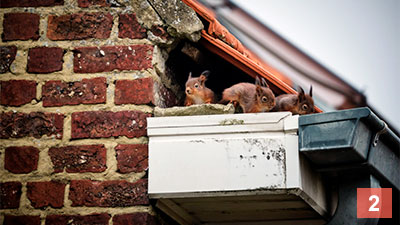
Proactively reinforce vulnerable areas with durable materials that resist chewing:
- Cover vents with 1/4-inch hardware cloth (not plastic screens)
- Install a quality chimney cap
- Replace damaged soffits or fascia boards
- Seal smaller gaps with steel wool and expandable foam
- Use metal flashing around pipe entries and roof junctions
4. Reduce Attractants
Make your property less appealing to squirrels by limiting food and shelter options:
- Use squirrel-proof bird feeders or relocate feeders away from the house
- Keep tree fruits and nuts picked up from the ground
- Store outdoor pet food securely
- Keep garbage in tightly sealed containers
- Remove brush piles and debris that could serve as ground nesting sites
When to Call Professional Help
While many squirrel problems can be handled independently, some situations warrant professional wildlife removal services:
Baby Squirrels Present
Professional wildlife technicians have the expertise and equipment to safely handle baby squirrels and reunite them with their mother.
Difficult Access Points
When entry points are in dangerous or hard-to-reach locations such as steep roofs or high eaves, professional services have the proper safety equipment.
Extensive Damage
If squirrels have caused significant damage to wiring, insulation, or structural components, professionals can both remove animals and assist with repairs.
Frequently Asked Questions
How long do squirrels typically stay in an attic?
If undisturbed, squirrels may occupy an attic indefinitely, particularly if the space meets their needs for shelter, security, and nesting. Female squirrels often return to the same nesting site for successive litters.
According to wildlife removal experts, once established, squirrels will continue to use an attic until actively evicted or until conditions become unsuitable. This highlights the importance of prompt action when you first notice signs of squirrel activity.
When is the best time to remove squirrels from my attic?
The optimal time for squirrel removal is during non-breeding seasons (typically November through January and May through July) when babies are less likely to be present.
Wildlife experts at The Spruce emphasize that exclusion methods should only be used outside of breeding seasons to avoid separating mothers from dependent young. If removal must occur during breeding season, professional assistance is strongly recommended to ensure humane treatment of both adults and babies.
Can squirrels in my attic cause a fire?
Yes, squirrels pose a significant fire hazard in attics due to their tendency to chew on electrical wiring. The damage to wire insulation can create short circuits and potentially start fires.
According to research from university extension programs, rodent damage to electrical wiring is believed to be responsible for a significant percentage of “fires of unknown origin” in homes. This risk alone makes prompt squirrel removal essential for home safety.
Will squirrels leave my attic on their own?
Squirrels rarely leave an established nesting site voluntarily, especially if it provides ideal shelter and protection for raising young. Without intervention, a squirrel infestation typically persists and often grows.
While individual squirrels may temporarily leave to forage for food, they will return to their nest unless actively excluded or the space becomes uninhabitable due to deterrents or environmental changes.
Is it safe to use poison to get rid of attic squirrels?
Poison is not recommended for squirrel control for several important reasons. Poisoned squirrels may die inside wall voids or inaccessible areas of your attic, creating severe odor problems and attracting secondary pests.
Additionally, poisons pose serious risks to non-target wildlife, pets, and even humans. Many jurisdictions have restrictions on rodenticide use, and wildlife experts consistently recommend exclusion and live trapping as more effective and humane alternatives.
How much damage can squirrels cause in an attic?
Squirrels can cause extensive and costly damage to homes. Their constant gnawing can destroy electrical wiring (creating fire hazards), damage insulation (reducing energy efficiency), compromise structural elements, and create entry points for water and other pests.
According to Pests in the Home from the University Extension, squirrels will also contaminate attic spaces with urine and feces, which can lead to unpleasant odors and potential health hazards. The longer squirrels remain in an attic, the more extensive the damage typically becomes.
Conclusion: A Squirrel-Free Attic
Removing squirrels from your attic requires a systematic approach that balances effectiveness with humane treatment. By understanding squirrel behavior, properly identifying the extent of the infestation, and implementing appropriate removal and exclusion techniques, you can successfully reclaim your attic space.
Always consider the possibility of baby squirrels when planning removal, especially during breeding seasons. Use exclusion methods outside of breeding periods when possible, and seek professional help if you suspect babies are present in your attic.
The most successful approach to squirrel management includes:
- Early intervention at the first signs of squirrel activity
- Thorough identification and sealing of all potential entry points
- Humane removal methods appropriate to the season and situation
- Comprehensive preventive measures to avoid future infestations
- Proper cleanup and remediation of affected areas
With proper planning and execution, you can effectively remove squirrels from your attic and prevent their return, protecting your home from damage while ensuring these wild animals are treated humanely throughout the process.
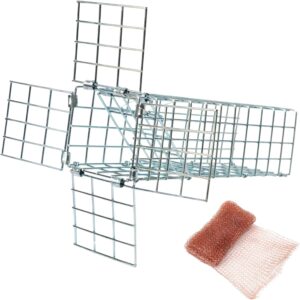
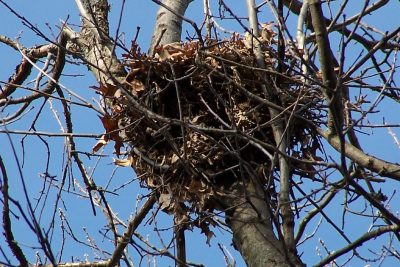
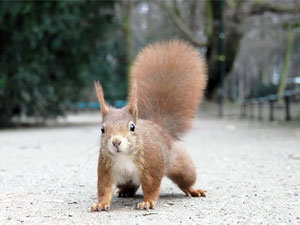
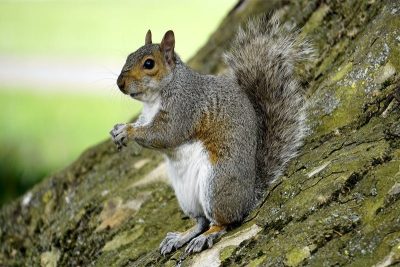

Allow them to become family members & support their lifestyle. Itl be fun.
TRIED 2 ULTRASONIC YARD SENTINEL IN MY ATTIC. DON’T WASTE YOUR $$. THEY DO NOT WORK! NEITHER DOES MOTHBALLS, AMONIA OR STROBE LIGHTS. BOUGHT ME AN AIR RIFLE……..
Rat traps and a BB gun have been the only permanent solution for me. Everything else has failed. And there is still one trying to chew it’s way back in.
Ammonia does not work had 6 towels soaked in Ammonia , the squirrels were back in 12 hours .
Why does Bill Earl not commit concerning ultra sonic pest deterrents?
I tried them and ultra sonic pest deterrents simply do not work.
Patiently and diligently stand guard, take aim and fire with a high powered pellet rifle. Works every time.
I am currently renting from my landlord and for the past 6 months our attic has had squirrel issues. My landlord sent someone over to fix the holes, but since the wood is deteriorating the squirrels keep chewing their way in and creating a new hole. I have tried: trapping, poisoning, squirrel repellent, ammonia and a sound emitter device to drive them out. All have failed. I am going slightly crazy. I am looking into a strobe light, moth balls and fox urine, but am running out of ideas. Would anyone have more suggestions on what to do? Any help would be appreciated.
Ok, Bill at your suggestion I’m buying the Evictor Strobe light. My house is squarish so if I put it in the middle it should reach all corners. I haven’t been able to find the holes but they are partying up there! I have squirrels and rats too. In Cedar Park, TX.
I bought a high powered sonic pest deterrent, put it in my attic and it did not work. My attic has many heating/Ac pipes in it so that may be why. Then I bought several boxes of natural repellent, that didn’t work either.
Russ asked if ultra sonic pest deterrents work but I didn’t see an answer. I’m curious also.
I hear pitter patter of little feet overhead. Saw a squirrel twice now in my yard. The problem is I can’t find a place it’s coming and going. Can they squeeze through tiny places I can’t see or find. Is there a particular place I should begin my search?
.22 rimfire rifle works a treat.
Do ultra sonic pest deterrents work?
We have been dealing with a pine squirrel (at least I think), for almost three years and have tried everything. Our house is surrounded by walnut trees and this sucker is FAST, so a pellet gun is probably not an option. Every hole my husband plugs is chewed through immediately. It chewed through 2×6 planks in the garage and is now in the walls so I’m not sure the strobe light will work either since it is not in an open space. It has chewed through the 2x4s in the walls too and runs the length of the wall behind the garage in our sunroom. When this first happened, we tore out the whole room (it needed a remodeling anyway, it just became a priority) and we blocked off all of the entry points. It kept finding new ways in. So we got new siding and blocked it off AGAIN. It chewed through the weather stripping on the garage door. We tried traps. That was a joke. I’m concerned about the safety of our family but we can’t keep putting money into something that isn’t working. We can’t even get it to come out with noise or banging. I just want to cry. I really don’t want to poison it but we are desperate! 🙁 Please help!
Hello Dontwantbadkarma,
I have solved many squirrel problems with conditions similar to yours. Please scroll back up this page to the comment I made for Luis on Oct 19, 2015…..and then a follow up comment for MPersall on Jan 26, 2016.
I have used this method successfully, many, many times.
I had somebody seal all their entryways with rabbit cage wire mesh, so far so good. I’ve heard them trying to open new holes on the roof. My next step will be to change the roof to metal, since I have to have the work done anyway. It will be more expensive, but they won’t be able to run around on it, that’s what I hope anyways.
I hate squirrels. They are rats with a bushy tails. I’ve had them because of rotten places on the boxing of my house they have chewed through. I think I have driven them out by making a lot of noise in the attack in the early part of the day. I have patched the holes and I have also purchase a high powered pellet gun. I killed 4 yesterday early in the morning. That is my new hobby. I plan to kill every one I see from now one. I hope they will eventually get the message.
Joe, sadly I kind of like your idea a lot! These critters are fierce and totally annoying!!!
Yeah I’m thinking the pellet gun will be it for me.
Squirrels are eating my hardie plank siding and Trex deck to file down their teeth. I have tried cayenne pepper, placing small sections of hardie plank away from the house and putting peanut butter on them in an effort to relocate them further back in the yard, throwing out a product I bought that they don’t like the smell of which actually works but I have to reapply every time it rains and I have been knocking their nests out of the trees. I’m exhausted! If I hire a pro to trap them and take them 40 miles away, how do I stop other squirrels from coming and starting the cycle all over again? I have kept them out of my attic thus far. They just jump from tree to tree to get to the siding and my deck. Trees are trimmed back and none overhang my house. They are fearless jumpers.
Pricing I have gotten is very expensive to have them removed. None of my neighbors are having this problem and I live in a very dense neighborhood.
What about peppermint spray?
We have a pesky squirrel that has been chewing the wood shingles on our house. He had squeezed in to our soffit and continually was scratching. We banged on the wall and he ran. All the entry and exit areas have been blocked. I soaked one area of shingles that I could reach with ammonia which seems to repel him (maybe her) for the time being. Now he is at the other end of the house. Hate to use poison, but may not have a choice at this point. Does anyone know how long ammonia will repel them? Ready to soak the whole side of the house with ammonia at this point.
On squirrel jobs, where the squirrels are chewing up asphalt or cedar shake shingles, I found that Ropel (liquid in a spray bottle) works well to thwart their activity.
Bill,
We bought a house this past fall and have quickly come to realize it is infested with squirrels. I hear them from the attic, my husband saw them run down through the eaves (when he was up there looking around) and into a back part of my closet right below, I hear them in the ceiling throughout first floor and the basement; I feel like they are EVERYWHERE and I’m so frustrated. I’m interested in trying the Evictor lights and I’ll be sure to get enough… Our attic is completely empty so nothing to obstruct the lights, but do the squirrels make nests anywhere but in the attic? Why do they go all throughout the ceilings? When I bang on the ceilings with a broom handle I hear nuts rolling around everywhere. When my husband was up in the attic the last time the squirrel ran at him and then one jumped on him so I’m skittish about looking for their entry points and poking around because I don’t want attacked. They’re red squirrels, we live in Ohio in a wooded area. I’m just needing a plan of attack because I’m so overwhelmed by this problem but it needs addressed asap. Thank you!
Hello K Copley,
Squirrel problems can be overwhelming, especially the ones where the squirrels have intermittently occupied a home for an extending period of time…..a stash of nuts in the ceiling is an indication that the squirrel problem probably existed long before you bought the house.
First, a few safety tips. Try to go into the attic between 10AM and 2PM when the squirrels are usually outside. BEFORE entering your attic, make a lot of noise. If there is an attic drop staircase, pull it down a little bit, then slap it up against the ceiling a few times. Shine a high powered flashlight into all the corners. Squirrels can read your body language. If you are skittish, they know. Try to act with authority….be loud with everything you do. I have been in hundreds of attics and have never been attacked…..not even once.
Your first question is going to be: Since the squirrels inhabit other parts of the house, other than the attic……will putting Evictor Strobe Lights in the attic effectively rid my entire house of squirrels? Yes and no…..depends on where the holes are. Obviously, if the access holes are below the attic, in the sides of the house, squirrels can still be a problem. But, most times squirrels access a home in the attic area and in general, after an Evictor installation in the attic, the squirrels vacate the attic within a day or two. I always try to error on the side of having to many strobes then not enough. The effect is quite dramatic.
I’d like to cover the concept of a squirrel’s territory (which is currently your attic) versus your territory (your bedroom, living room, kitchen, etc.)
I solved squirrel problems in a townhouse community where everyone (except one particular woman) was having an attic squirrel problem. I wanted to see her attic and understand why she did not have the problem. I found that her attic was unfinished and identical to all the other attics. There was one important difference. She had a home business and was using the attic for storage and was in and out of the attic at least twice a day. Her activity defined the attic as HER TERRITORY.
I believe Evictor Strobe Lights work in similar fashion….after an Evictor installation, an attic is now re-established as the homeowner’s territory.
What about using the Ultrasonic sonar pest controls that you plug into an outlet. Will those work?
If you can get it, direct word of mouth from people you know is the best referral. On the Internet, people will go through great lengths just to sell their product. It’s such a turnoff. Good products sell themselves, because your real live neighbors and friends will be talking.
This is exactly why Amazon has been so successful. Reviews, both positive and negative (which cannot be controlled by the seller) provide a unique insight into the use and value of each product they sell.
Charles, you might try reading an article that appeared in Pest Management Professional, entitled: “Light Makes Right” by Heather Gooch.
It is about Massey Services in Florida (5th largest Pest Control Company in the USA) and their success with Evictor Strobe Lights.
DO NOT buy the Evictor Strobe Light. I’m not sure who is having success with this product but ammonia on a rag works better as a deterrent. Save your money and you can even get products at Home Depot. Good luck to all. We are in the process of getting squirrels out of the attic that were not deterred by the Evictor Strobe Light.
I live in Texas where the summer temperatures can top 100 F outside. The attic gets unbearably hot then, and I am wondering if the squirrels will evacuate as the summer comes on. I started hearing them a few months ago in the cool weather and this has been the first time in 30 years we’ve had a problem. Would they just be using the house for a temporary breeding facility? It would be nice if they leave on their own so I can block all the entrances and cut back the tree limbs around the house.
Yes, as a rule, squirrels will vacate the nest when the attic temperature gets unbearably high.
Yet, there are significant disadvantages in letting the squirrels occupy the attic for a complete cycle, unchallenged. The whole time the babies are growing up, before they leave, they are urinating in your attic, marking the attic as a future nesting site, increasing the likely hood that they will return in the fall.
The trees can be cut back immediately…..squirrels are very resourceful and the mother will find a way back to the attic nest. If you find a nest and there are babies……put the nest (and the babies) in a cardboard box and place on the ground close to the house….the mother will find them. If you are concerned that the mother will not have a place to raise the babies, buy a Duncraft Squirrel Box and screw the box to a nearby tree. Place some peanut butter on a peanut butter cracker inside the box, so the mother will find it. I have used this method many times…..works well for homeowners who really don’t want to harm the squirrels, but still anxious for the squirrels to relocate to the outside, ASAP. Other hints can be found in a booklet I wrote, that pops up on the internet:
“How to Evict Squirrels, the Safe and Harmless Way”
My son and I just watched a grey squirrel go thru a hole in my facia behind my gutter that is sagging because of an ice damn. My attic has blown in insulation so im not sure the strobe will work, wouldnt they nest in the insulation?
Hello Pete,
Grey squirrels tend to nest on top of the insulation and form it in the shape of a bowl. Instructions for the Evictor mention that enough strobes should be purchased to cover the entire attic.
BUT, if you have deep piles of insulation, the insulation itself may tend to block the annoying effect of the strobe light and it doesn’t matter how many strobes you hang. When I have encountered such a situation with deep insulation, I noticed that the squirrels had gone one step further and actually built a kind of insulation wall around the nest to block the light.
What I did was hang an Evictor Strobe Light directly above the nest. They got the idea, and moved out. (they could have created a new nest in another part of the attic, but they did not) If you want to give it a try, this is the first place I would put an Evictor Strobe Light…..directly above the nest.
Thanks bill earl. WE caught A squirrel in the trap above the exit area ..We put the trap on TOP of the roof with peanuts, and sure enough after 3 days he went for it!! Funny thing it was pouring raining out doors, so maybe he took a chance to eat the stuff inside the cage, because he didn’t want to go outside in the rain in 40 degree weather to go and venture for other types of food they consume… Who is to to say… Since we caught this one particular squirrel, I have not heard any more noise in my attic….. I’m praying he was the only one!! Also the trapper guy stated that it was a female and she was pretty plump. He said he released her many miles away. I think she was getting ready to have her young. IF SHE Didn’t ALREADY IN MY ATTIC??? BILL How do you know if they are pregnant when you catch them or have recently given birth? Do they have nipples after giving birth???? A SMALL d….
Hello Karen,
I do not trap squirrels. I do, however, solve advanced attic squirrel problems when trapping does not work and house damage is extreme.
You might want to check out a booklet I wrote. It pops up on the internet and is called:
How to Evict Squirrels, the Safe and Harmless Way
Yes, Joe, I have encountered this situation many times and the Evictor Strobe works well to solve your problem. This is the sequence:
First, unfasten the chicken wire. The nest may or may not have baby squirrels. If no baby squirrels, simply trash the pine straw. (Larger baby squirrels will immediately vacate the nest as soon as you work on the chicken wire.) If (small immobile) babies are present, use heavy gloves and place the babies (with the nest) in a small cardboard box and place the box in the backyard a short distance from the house…..the mother will find the babies.
The next step is to refasten the chicken wire and mount an Evictor Strobe Light about 2 feet directly below the vent. Leave the Evictor running continuously, 24/7. Depending on the severity of the squirrel problem…..I leave the strobe running for a month, 6 months, or a year.
Use damage to your roof shingles as a barometer on how bad your squirrel problem is. If you have a lot of shingle damage, leave the Evictor on for an extended period of time as a reminder that the fan area is a bad place to be.
It’s likely that you have an electric powered attic vent fan. The Evictor web site shows how to fashion 1/2 inch steel hardware clothe on the outside of a new fan. I suggest you put off the outside repair for about a month. You want the squirrels to have easy access to view the strobe and think “I don’t think so” and develop the habit of NOT wanting to be there. I virtually have a success rate of 100 % with this type of Evictor Strobe Light application.
I’ve had it. Scratch scratch scratch right over my head in my bedroom. Wakes me up in middle of night. Put Decon up there. Did not work. I think one is in front of house as well. Heard some horrible squealing sound. I think the squirrels got in a fight. Bought a live trap cage. Baited it with crackers with peanut butter. Didn’t work first night. Expect to go up there are and the crackers will be gone. On day light saving day when I’m already losing an hour of sleep what I think is a squirrel had the nerve to wake me up at 3am scratching in the attic over my head where I’m sleeping and it has to be super loud since I sleep with the fan on. Banging on wall makes them stop for a few minutes. Turning on attic light helps a bit. Maybe I should let my cat up there. He would be in heaven. No clue where they are coming in from. Guess I should hire someone. Anyone know how much it costs to trap and relocate plus patch up holes they are coming in?
You may not want to watch this squirrel eviction seminar video……..watch it anyway.
I have a squirell babies living in my roof vent where I already had chicken wire. They have nested with pine straw on the chicken wire inside the vent. Will a strobe light help make them leave the vent?
I also wanted to ask you, I’ve been noticing a musk like smell in my living room space (right below where the squirrels are in my attic. I hear the noise around 530am I live in Connectcut. The trapper my landlady hired states he never heard of such a odor and I have found out that this is common . He supposed to have been in the business for over 10 years. Is he pulling my leg ? I now have birds and squirrels who must be cohabitation get in the same space, Is this possible . I’m almost certain this grey squirrel has young ones in the opening up in the attic Because there has been a lot of noise for just one squirrels.Please help me out with some info. That’s a small d. Thank-you
Hello Karen Del Bianco,
I am not sure to whom you are addressing your question….. but I can provide some information relevant to your problem.
The trapper guy is right about birds and squirrels not cohabiting the same attic, at the same time. From my experience I have also found this to be true.
However, with 40 years of experience troubleshooting roof leaks (caused by squirrels) and gutter problems (caused by squirrels nesting in gutters under gutter guards) I have found that the time of year that squirrels have a litter can vary greatly. I once removed a squirrel’s nest (with babies) from a gutter in mid July. I also once removed (two) separate squirrel nest from a single (Styrofoam) window ornament where the babies, because of a huge difference in size were obviously not conceived at the same time.
You have mentioned an important distinction between a squirrel problem and a bird problem. Grey squirrels are not at all quiet, especially in the early morning hours. Their running and jumping is very distinguishable. Another verification is the sound of a low grade gnawing, wood grinding noise. This is the sound of a parent squirrel making a secondary hole…..sometimes necessary for the baby squirrels to make an easy exit from the attic.
I just had a conversation with The man who my landlord hired to get the squirrel and 2 Black birds out of the attic . He has been rude And I told him of all the research I did, on the Internet, Which I might add were with reputable web sites. He states Its too soon ( March 11) for the grey squirrel to have young (off-spring) yet?? Is this correct? Also he put the trap unstop of the roof, not at the entry location. Is this the right way . How do we know if it’s the same grey squirrel if in fact he does catch one. I need some feedback if you please.
I placed cayenne pepper, crushed red pepper and paprika inside several Clorox cleaning wipes and tied off the tops. I then placed them around in the attic while my squirrel Tenants were out in the yard. It has proven to be very successful to get rid of them all!
Brittany I believe your idea sounds great! Is it a permanent solution once they have left the attic or do they or new ones come back? How long did it take for them leave? Did you use commercial spices, fresh or homegrown and dried peppers?
We tried traps, strobes, smelly stuff and nothing worked.
We called a pest control company that wanted lots of $ with little/no guarantee.
So we bought a Ruger air rifle. Every once in awhile we have a squirrel issue, but it sure is fun popping those little darlings and addressing the problem on our own terms!
would a rat terrier work on squirrels. some people don’t like cats. Rat Terriers are small dogs and could be put in the attic.
Thats funny Tony. I was thinking about putting my terrier up there as well! Happy trapping!
Help!!!
Im in Detroit MI in an area heavily populated with trees and squirrels!! I bought my home 3years ago and have been battling with squirrels since I’ve bought their property. Had 2 professionals come in with traps and both cost too much money and were unsuccessful (traps are still empty behind loft wall)! Hired 2 different companies to seal up entry holes from roofline and it worked for a few days but sure enough, they return and Im out of my money again and frightened by the noise I hear over my head and the thought of an encounter with them! Does anyone have a Company with success at ridding squirrels in this area?
Hello Monique,
I don’t know any Pest Control Companies in your area, but I have solved many difficult squirrel jobs over the phone.
We have had squirrels for some months in our attic and it spoiled the wires and pipes at there . I tried to trap them through different ways but failed. But we soon got rid of them through Remove the wild , animal and bird specialist.They are licensed pest and bird and animal /wildlife control here in Toronto.
If my roofer has closed holes and there is a squirrel still in the walls how long will it take before he ‘kicks’ ?..do I have to have him come back and open up the hole to try to get him out?
Hello AB,
It is in your best interest to have the roofer come back in a couple days and open the hole back up, for two reasons. First, a dead squirrel in your wall can give off an ungodly odor and may eventually draw a host of maggots and flies. Second, though it’s strength may be reduced for lack of food and water, it may start to chew through the wall, if the wall is made of dry wall. (I have never seen a seen a squirrel chew through plaster and lathe.)
A trapped squirrel can last for about 3 days. I found out (by accident) that a squirrel trapped in a wall for 2 days and then allowed to escape, is reluctant to return to it’s old home ( inside of your wall). So, trapping a squirrel for a limited amount of time can be an effective home avoidance squirrel training tool.
In general, it seems best to let a trapped squirrel escape as soon as possible. A dead squirrel in the wall emits a kind of smell that you really don’t want to experience.
We have tried Cameras , we just can’t find the entry point . Had professionals here and no luck , poison and traps in loft but still can’t stop it . Had rats which have been caught now squirrels, had no rats for ages now this , how do we find the entry point, fully checked and no luck
Darren,
Do you know what kind of squirrels you are dealing with?
I saw one once one the side of the house and it was a grey squirrel , so I’m guessing it’s that , there aren’t any opening around the house so are they getting in from underground ?
In general, grey squirrels do not use an opening lower than the first floor roof. But, recently, I have been on jobs where squirrels entered through a bathroom exhaust vent and even a dryer vent on a first floor wall. (check for chew marks on the vent cover and install a screen… to be safe)
Normal places to check:
Attic vent fans….look to see if the screen is made of steel, is fitted correctly and no distortion.
Louvered aluminum gable vents…..check for damage to inside screen.(outside may show very little damage)
At a dormer location, where the aluminum sofits meets the roof…..squirrels use like a trap door (either lifting up or squeezing under)… area may show very little distortion or damage.
The inside of a chimney….unusual, but twice I have been on a job where the squirrels gained access to the attic by climbing down into an unlined chimney and pushing aside a loose brick. (All chimneys should be capped anyway to prevent a squirrel from falling in at a later date)
I take for granted that you have already checked
all the roof lines. (I carry binoculars on the truck for that purpose)
Darren, the easiest way to find the general location of the entrance hole is to stand some distance from your home at dusk and dawn and observe the activity. (particularly a dusk, since if it is cold outside…..they are anxious to return to their home…your attic) Make sure you leave your house at random times, preferably using different doors, to observe your house. Try not to make it obvious you are looking for them. They are aware of who you are…they are watching you… watching them. (sounds strange, I know) but they are very intelligent and don’t want give away their entrance location.
This advice is for grey squirrels….with flying squirrels the advice is different.
I think it is a combination. Some claim that it didn’t work for them, so they can get their money back (and then have used the product successfully for free.) Others do not buy enough lights to cover the attic area and/or have a cluttered attic that hinders the effectiveness of the strobes. Squirrels will still come and go with the strobes operating…..they will run past a strobe light and build a nest in a dark part of the attic. This is why enough lights to cover the area must be purchased. Some homeowner (to cut cost) get creative and move the lights to different areas and also some have installed mirrors.
What makes the Evictor Strobe Light so effective (when used per enclosed instructions of course) is that an animal’s eye’s cannot adjust to the contrast of extreme brightness (175,000 candlepower) and total darkness. I admit that I have been in the attic with the Evictor Strobes blinking away and within a couple minutes you start to feel sick in your stomach…..like a motion sickness.
The mother squirrels always take her babies with her. Sometimes, if it really cold outside, I will put a squirrel box up in a tree outside the house to ease and speed their transition. Sometimes, some homeowners turn off the strobes for short periods of time until the mother has got the babies out.
Something that should be mentioned is that: in a situation where the squirrels have occupied an attic almost continuously for 35 years… after an Evictor installation…. for the first night, the squirrels (not used to something they cannot control) get incredibly noisy. Then, after one or two nights of noise, they leave. My customers think it is nothing short of a miracle.
Bill
Hi Bill Earl,
Thanks for your response.
Why do some of the Evictor users claim that it didn’t work for them? Do you have better instructions on how to use Evictor Strobe Light more effectively? Or are they not being truthful?
Would using cheaper LED strobe lights be as effective as using the Evictor Strobe Light?
If the mother squirrel hasn’t weaned her babies, would she still move out of the attic in reaction to the Evictor Strobe Light?
Thanks,
Joel
Joel,
You have made some good points. I have personally installed (literally hundreds) of Evictor Strobe Lights over a ten year period… many different times of the year….many different weather conditions. You are right, the optimum time to evict the squirrels (with or without) the strobe lights is early on, before they are firmly established in your attic. Then, (if the holes have been found) they can simply be closed. Job finished, problem over.
But, I solve the very worst squirrel problems out there. The ones that everyone else has walked away from, the ones that have defied a solution for 30 or 40 years, the ones where squirrel damage gets progressively worse and the home owners so discouraged, they have simply given up on finding a solution. That being said, I know that I would not, and could not have had success at getting rid of their squirrels without the use of Evictor Strobe Lights.
Think of the Evictor as a training tool. The squirrels want to come in……Evictor Strobes changes their attitude from WANTING……to NOT WANTING. This is important. This prevents future damage. When a squirrel really wants to come, they ARE coming in. They are going to chew (and I have pictures to illustrate extreme squirrel damage) straight through good shingles and good wood.
Yes, in the dead of winter it may take a couple days longer for them to vacate the attic. (It takes time for them to ready a new nest.) But, if the correct number are used and installed properly, Evictor Strobe Lights always evict attic squirrels. The squirrels cannot build up a resistance….the Strobes are simply to powerful and intolerable.
Sometimes I am really amazed that they are so effective……makes my job a heck of a lot easier.
Just read many of the comments in amazon for the Evictor Strobe Light. It seemed close to 50% said it worked and 50% said it was an expensive waste of money. Think it through that it may work as a deterrent only at certain times in the species of squirrels reproductive and life cycle. If they have already created and selected a nest, stored lots of acorns for winter, the temperature is too cold or there is snow on the ground so it would be difficult to find another winter home, or they just had babies that are too young to move, then a strobe light will be tolerated as a nuisance. BUT if you catch the squirrels when they are in the process of selecting a mate or a nest, then a strobe light or bad odor or high frequency sound may be enough of a nuisance for them to look for a more hospitable home. Also, if the babies grew up where these deterrents existed, they may now ignore them as they did before. So if you have timed your placement of deterrents right and your attic is squirrel free, that is the time to seal up the holes with metal or whatever material that they cannot chew or claw through, cut down nearby trees or branches, etc. So, we or someone needs to research this to determine this optimum time. Also, you might want to then put up metal on possible places that they might try to open up in the future like the corners of the roof eaves. Do you think this plan makes sense and may work more reliably?
a lot of good suggestions, will try some of them, especially the strobe light. thanks!
Try the Evictor Strobe Light. It’s available from Amazon.com. Within 2 days the squirrel will be gone.
We have just accommodated one in our loft
I need it gone asap
Any local companies in the Midlands area
Try getting coyote scent at a hunting shop online.
Cats are great. (if they are unfed outside cats) They will reduce the rodent population thus keeping the copper heads from finding an interest in my yard.
I’m following up. Not only did my cats get rid of the problem squirrels (permanently) but all of the other squirrels are staying off the roof. Trees overhang my house and both the cats and squirrels used to coexist there. Not anymore.
For anyone wondering, the cats dispatch squirrels quickly and bloodlessly. My city cats instinctively took care of business but lost interest when the squirrels stopped moving, which took less than a minute.
Thanks for the info Bill. It may come in handy some day.
I have asked around and rat traps with peanut butter or D-Con with some peanut butter on the edge of the tray is the way to go. You are going to have to figure out how to get the poison in the walls or perhaps poison them in the yard when they go out to eat. A rat trap nailed to a tree makes a good way to get them too.
My attic is finished I have many of them in between the walls (no access to it, unless i make a hole thru the dry wall). I think they are moving even further from the front of the house inside in between the floors and ceilings of the different levels of the house. They are just driving me crazy. I have tried rags with ammonia thru holes on the dry walls. I am ready to use tons of rodent poison in between the walls.
Unless I get here a good suggestion on what to do and make them leave my house
Thanks.
I have successfully completed many squirrel jobs, under similar circumstances, where the place they inhabit (like the inside of a wall) is not easily accessible.
This is my method:
I find the holes. (Usually there are two…..a main entrance and an emergency exit.) I block all the holes, except one, preferably their main access hole. With this remaining hole, I coat the rim of the hole, lightly at first, with a product called 4-the-Birds gel. This stuff is incredibly sticky……squirrels absolutely hate anything that sticks to them. It is important to coat the hole lightly, at first…..I let the squirrels come and go as them please……every two to three days, I increase the 4-the-Birds coating around the rim of the hole. Unwittingly, the squirrels are tracking the sticky gel everywhere they go and especially back to the nest. After about a week in a half, you will hear less and less noise……the squirrels catch on that where they go inside the walls has become one big sticky mess, but it’s TOO LATE….they have already ruined their home. (the inside of your walls)
I have used the method successfully many, many times. It works good as long as the spaces they inhabit are small, and if they appear to travel the same routes every day. As a added bonus, if you evict squirrels professionally, you will easily be able to size up the severity of the squirrel problem, by the amount of fur that sticks to the edges of the hole.
Seems like a double assault of the gel and a pepper extract would make the little critters completely insane.
Hello MPERSELL,
Keep in mind that when using the 4-The-Birds gel method, the idea is not to drive them out of their minds. I use their intelligence and persistence to my advantage. By letting the squirrels come and go as they please and steadily increasing the gel around the edge of the hole, the squirrels unwittingly track the gel back to the nest. Slowly and steadily they make their habitat (inside of your wall) an uninhabitable place.
If you use this method, try to increase the gel around the hole at a steady, but not excessive rate. You want them to use this same hole and not start another.
When I first started to use this method about 10 years ago, I discovered the results of using to much gel.
When I returned to a home, the mother squirrel had placed a gooey dead baby squirrel on the roof for me to see…..as if she was saying, “see what you did, you killed my baby.”
So, go easy on the gel application. The mother, who has been tracking the gel back to the nest needs time to build a new nest and relocate the babies.
Usually takes about a week or two for the squirrels to vacate your walls. Remember this method only works if the squirrels repeatedly travel in a confined place and are using the hole that you are applying gel to.
Also, you may find out (as I have found out in the past) which squirrels have been entering your home. Sometimes they do some lively gyrations running up and down trees trying to get the gel out of their fur.
Workedf like a charm Bill. Thanks!
Really, Wow I need to find me a cat. I have a family of those things in my attic. They sound like grown men walking and running around up there.
Try some coyote or wolf scent. You can get such stuff at hunting shops online.
Get the poison that causes thirst. They will leave to drink and die out side of the attic!!
I want to poison the bastards. Will rad poison work?
yes
If you use poison then they can die in your attic, leaving a bad oder for weeks
I put my cats in the attic in the evenings. They take care of the squirrels. 100 percent cure.
Really, Wow I need to find me a cat. I have a family of those things in my attic. They sound like grown men walking and running around up there.
My cat is terrified when I’ve put him up there and will now fight tooth and nail NOT to be taken up there. Must get a really bold (and probably large) cat.
thanks for the info but I do not think I will resort to getting a cat to get those squirrels out, working on covering their entry ways….thx again!
Oh no! Squirrels will tear up your cat and you will have a badly mauled pussy and huge vet bills.
Ah! If I only had a cat! (Sigh)
Squirrels can return from a drop point as far away as 10 miles….to be safe take them 20 miles away….or on the other side of a bridge.
I have had good luck with a product called the Evictor Strobe Light. I live in a twin home and squirrels were coming through the wall from the abandoned home next door. I have (3) 10K units in the attic crawl space…..been squirrel free for 10 years……I swear by this product.
How about off the bridge!
Shoot them then dump them off bridge 10 miles away
I’ve got a better idea. Make them lunch. For yourself.
But seriously, last year I got rid of them by putting a stinking pissy dog bed up there. Just noticed they are back this year, tonight! Just put another fresh nasty damp-with-pee dog bed up there. Should soon do the trick again. I have an old dog.
I have removed 10 squirrels from my attic and release them on the other side of the lake a few miles away. Is it possible they are finding their way back or is it probably different. Squirrels? Thanks.
My father trapped tons of them. At first he thought the same ones were returning so he spray painted a tail blue. Sure enough, the guy came back! You have to take them 10 miles or so, away.
My brother did the same with mice and sure enough the same buggers came back from relocating a few miles away.
yes it is. I was told that they are good at making their way back even from further than a few miles
Or release them in the lake!
I figured keeping them in the cage and releasing the cage into the lake was the way to do it . I’m not wasting gas to drive for 20 miles , possible risking it damaging my house again costing me more money making me purchase more materials to repairs ? It’s not an endangered species ffs it’s a rat with a fuzzy tail so we have to be more compassionate ? Do we care when the trap snaps the rats neck ? Shoot them drowned them . It’s more green than re-releasing this repeat offeneder . When someone keeps committing crimes we lock them up or kill them . So now you want me to pay for jails ? Ok so now we have to hire someone to feed them. What are you going to resort to strobe lights ….The Waterboarding of squirrel tourture ? I don’t care what Bush and Cheney said : inhanced removal technics ….it’s tourture and its wrong .
If you trap them, kill them. This will make sure they dont come back. Grab a pellet gun. Boom, done. No worries about it coming back. Hang that sucker by its tail as a message for the others.
Squirrels can be a big problem if they choose to live in your roof. The first thing you need to do is to remove the ones that are living in your roof by trapping, cage traps in the roof work well, but ones set outside are fine as well, we bait them with monkey nuts (peanuts still in the shell but broken slightly open) and honey nut cornflakes set in peanut butter then leave a trail of a few peanuts at the entrance of the cage to tempt them in. They just cannot resist getting hold of the monkey nut shells and breaking them open, in fact I don’t think this technique has ever failed to work for us. Make sure you set the bait firmly in peanut butter on the trigger plate and put a weight on top of the cage to make it more stable and stop it moving about once the squirrel is inside. Fenn traps or Kania 2000 traps are really good too but if you are not familiar with them, you WILL more than likely end up with damaged fingers! Make sure you have caught them all which can take many weeks as they seem to travel around more than one property over a period of time. This is especially true during mating season when the male makes several nests and the female chooses the one she likes the best to rear her young in. The next step is to proof your property where they have been getting in with the original materials or wire mesh screwed down and secured. The last and final step is to work out why they chose your house in the first place, usually its the house at the end of a row next to a tree or the house in the corner of a secluded development, again usually next to a tree. The tree next to your property needs to be cut back leaving at least a 6 foot space to discourage them from jumping onto your roof in the future. Squirrels have a terrific memory, if a squirrel was born in your roof, it will more than likely return at some point in the future, especially if the roof is now vacant of all other squirrels so be on your guard. Being squirrel free will depend on you doing all of the above and sometimes more. We have trapped and removed thousands of squirrels over the last 20 years and the damage we have witnessed to property is just horrific if the problem is left to carry on un-checked. We once removed over 110 squirrels from one single property, over a period of about 18 months, mostly in the garden, but is shows you the potential of what you may be up against. If in doubt, call in an expert. Squirrels are nice to look at and a lot of people feed them but its just an open invitation for the squirrels to stay. They are vicious little things, so be warned they will attack and bite you if they have young in the roof any you disturb them, their teeth are long and sharp, they are able to bite all the way through your finger or even your hand, yep, almost got me once but not quite! We have found that it is such a big problem in the last few years that we developed, sell and fit a special loft monitoring system for squirrels now as part of our work. We are squirrel removal specialists but we are in Derbyshire Great Britain, having said that, our advice is always free, just ask, good luck.
Your advise was greatly appreciated. We are in Michigan so obviously won’t be doing business together. I am starting with the traps and hopefully will have the same success as you with the monkey nuts!!!
Would environmental health be able to help
You have a real talent for putting your thoughts into clear, original content. Your article is easy to read and understand. You have brought forth some really good points that I agree with and appreciate.
We have had squirrels for 6 months and they come in next doors and come our side by the fixing box above the window under the guttering on the front of the jouse and in through the dividing wall. We have the trap with peanuts but they have not touched them. I will try peanut butter! And then the bleach if that doesn’t work. We see them on the bird table, he goes on the fence all round to the house, jumps on the corner of the house, on the guttering on the back of house and then disappears.
Only thing I found in town a pellet gun with a scope
Please…they are living beings. So not shoot them it causes a lot of pain. Many of us would appreciate for you to be humane. Thank you
How humane is it to kill your family and pets through a house fire caused by the filthy rents gnawing on your wiring? Grow up and prioritize human life over rodents!
You’re right
The family is first
I like the animals as long as they are not causing any real danger and damages
I am all for letting animals live but if they are in my house NO. Stay in the woods. I don’t want a fire, and I don’t want to be woke up at 4 AM with them eating my house.
You got that right!
Humane they can bite and I have to worry about rabies. I say their numbers need to be culled. The problem is our encroachment on the animals that naturally keep their numbers down.
I hear them on the attic fan louvers. A quick turn of the switch ( on then off real fast before the louvers open) and then I have one less squirrel in my attic.
I agree. Do what you have to. They are large rats!!!
I know, but there are so many humane methods.
I agree. I just went tonite for a little .22. My light switches are at the point where half of them dont even work
Damn right. Kill the rats with fuzzy tails. Do what has to be done. Give your address so others will bring there caged rats with tails to your house.
Yes.However,property damage is inhumane,besides the serious fire hazard,if they chew wiring and cause a short.Put people,Guess,Iplease.
Also keep in mind that the humane relocation texhnique places this colony into a very hostile environment filed with other squirrels that do not want them. It’s a painful life of survival with a family displaced. The most humane solution is leaving them in your attic. Shooting and scattering them out of your sight are about the same.
Are you serious? Leave them? Youre such a faggot, swriously. You shouldve been a girl
Or swallowed
Yeah? Wanna fund my extermination services? I don’t have the money & this is my house & after the stress & damage they’ve created-I could care less if they’re in pain.
Who cares. The squirrels in my attic have given me anxiety attacks, nightmares, and untold fear and stress. Who’s more important me or them?
Then u come save them bring them to your house not mine once the winter is over I’ll sit in my yard and shoot as many of these f in things as I can till that move
They are fuzzy rats!!!! They will destroy your house, they don’t care about you.
They don’t care about pellets. Get a .22.
I think if you have a powerful pellet rifle its quitter. There are local rules about killing squirrels in my city so you have to be very careful what you do. when I catch squirrels I transport them a great distance
We have one in our attic. We have closed up the holes they have chewed through the vinyl siding. But they just keep making new holes to get back in! This is driving me nuts! HELP! LOL
i hear you, these little guys are relentless. Im going to try soaking a couple of rags with bleach, i heard this works.
Did this work?
I made a few bleach bombs myself, crammed bleach soaked rags in every hole I could reach, squirted bleach into holes close to the nest, used a leaf blower to demolish their nest-and plan to get a bucket with a pump-get another 20 gallons & go to town on those bastards.
Spray of coyote pheromones covers l5 feet…spray in every direction of attic and the squirrels will leave. Instinctual smell of predator will do it.
I have set a trap 4 a month, put out fruit, nuts in cage still nothing. On top of that, can not find entry area. He’s been there a little over a month.
Your cat will tell you where they are getting in…
Wait for one more month. Have patience
Use peanut butter and put Honey Nut Cheerios on that
Peanut butter in traq
Iset a trap this morning in front of my garage (were they run to get to birdseed) I put peanut butter in the trap.caught one around 11:00am.they had 3 nbabies in mt attic.released it in woods by a sream, probly will let others go insame spot when I catch them.LOL
Over 30 days and you can charge rent….I know its nuts.
Squirrels in my attic.
squirrels coming in under my eves
Have you tried the ammonia soaked rags? Did that work? I tried the trap they are to smart for that.
Yes tried the rags
They ran to the top of the roof pacing like they were having a nervous break down. Were gone for months.
Back a couple of days ago.
Put new rags in today and going to cut limps off near roof. Also, ties up old socks amonia soaked and threw them around attic.
I have been successful with traps..have caught at least 10-12 squirrels..I caught them outside in the summer..now I don’t know what to do..still hear them in attic..sounds like 1. Do not know how they are getting in..will wait for snow to melt and then go out and look for entry point.
In Tennessee a solution to “what to do with them” is to invite a few “good ol boys” that love “squirrel and biscuits”. They’ll be gone and you all will have a nice cookout with new friends. Seriously.
I bought 2 trap set, 1 big and small. Bait the big bottom trap with a peanut butter jar baited with peanut butter, celery, other vegs/fruits. Place the smaller trap on top. Holding the smaller trap on top with zip ties. I use tie wire whenever possible. Works almost immediately.
Burn the structure down at night when the squirrels are sleeping.
Then rebuild using bricks w no attics. Your welcome in advance.